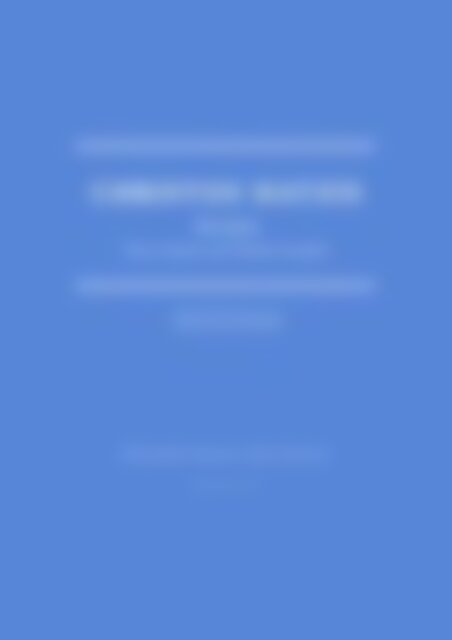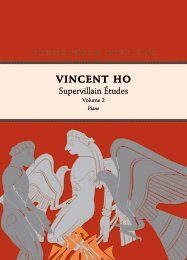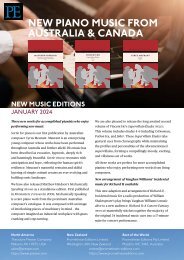Arcana
Study Score | Mezzo Soprano and Chamber Ensemble
Study Score | Mezzo Soprano and Chamber Ensemble
- No tags were found...
You also want an ePaper? Increase the reach of your titles
YUMPU automatically turns print PDFs into web optimized ePapers that Google loves.
Christos Hatzis<br />
<strong>Arcana</strong><br />
Mezzo-Soprano and Chamber Ensemble<br />
Facsimile Study Score<br />
PROMETHEAN EDITIONS<br />
WELLINGTON
Christos Hatzis<br />
<strong>Arcana</strong><br />
Mezzo-Soprano and Chamber Ensemble<br />
Facsimile Study Score<br />
Score version June 2005<br />
<strong>Arcana</strong> for clarinet, viola, violoncello, percussion, voice and piano, was<br />
commissioned by Arraymusic with funding from the Ontario Arts Council.<br />
It was premiered by Christine Frolick (Mezzo-Soprano) with the Arraymusic<br />
Ensemble at Winchester Street Theatre, Toronto on the 29 October 1983. It is<br />
set to a text by Gwendolyn MacEwen.<br />
This edition is a facsimile of the original score provided by the composer.<br />
PEFCHAR<br />
© 1983 Promethean Editions Limited<br />
PO Box 10-143<br />
Wellington<br />
NEW ZEALAND<br />
www.promethean-editions.com<br />
+64 4 473 5033
Instrumentation<br />
Clarinet in BÏ<br />
Viola<br />
Violoncello<br />
Percussion<br />
Mezzo-Soprano<br />
Programme Notes<br />
“When I first read Gwendolyn MacEwen’s The Nine <strong>Arcana</strong> of the Kings,<br />
I was immediately captured by both the intense imagery and the subject<br />
matter. These poems burst with emotion: volcanic eruptions of despair, and<br />
numbing pain set against descriptions of water, fountains and especially<br />
blinding and intoxicating light. They have the power to carry the reader<br />
into the unknown worlds of collective memory and explore its luminous and<br />
dark corners. Reading these poems is an enchantment; it is like looking at a<br />
multifaceted crystal with “brilliant and original verbal surfaces” (Margaret<br />
Atwood).<br />
In an effort to make these poems more meaningful from my own point<br />
of view, which is essentially Christian, and at the same time make them<br />
more “open” to personal interpretation on the part of the listener, I have<br />
taken them out of their specific historical context (which I presume is the<br />
reign of the mysterious and fascinating Pharaoh Achenaton, 1367-1350 BC)<br />
and placed them on a more universal plateau. Thus the lament of princess<br />
Meritaton over the dead body of her brother/husband Smenkhare (both<br />
children of Achenaton and brief successors to his throne) becomes in my own<br />
vision the lament of Maria Magdalene over the dead body of Jesus. It is this<br />
transposition that has inspired the composition of <strong>Arcana</strong>.<br />
These particular poems of MacEwen’s carry their own music within them; it<br />
was not possible for me to impose on the text any of my own musical ideas.<br />
I chose rather to unravel and bring to life what music was already there<br />
to begin with. Certain allusions and references to works or styles of other<br />
composers have been called for by the text in a non-conscious manner, and it<br />
is with these subconscious archetypal threads that the primary fabric of the<br />
piece is woven. One such reference is the fugal treatment of the Byzantine<br />
chant “Ton Nymphona sou vlepo...” (I see your bridal chamber, my Savior,<br />
and I wear not the proper vestments to enter it) at the end of “The Prayer”,<br />
and there are several more. These references do not constitute some kind of<br />
stylistic trend on my part, but are part of a philosophy of subordinating one’s<br />
musical personality to the literary requirements of a poem.<br />
© 1983 Christos Hatzis


















